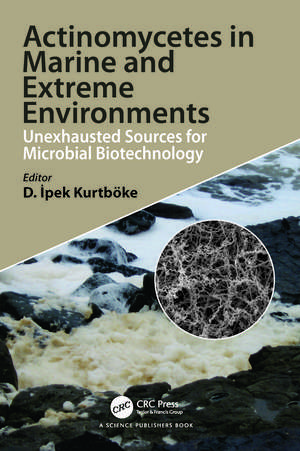Actinomycetes in Marine and Extreme Environments: Unexhausted Sources for Microbial Biotechnology
Editat de Ipek Kurtbokeen Limba Engleză Hardback – 6 feb 2024
Preț: 1073.06 lei
Preț vechi: 1308.60 lei
-18% Nou
Puncte Express: 1610
Preț estimativ în valută:
205.33€ • 223.94$ • 173.14£
205.33€ • 223.94$ • 173.14£
Carte tipărită la comandă
Livrare economică 24 aprilie-08 mai
Preluare comenzi: 021 569.72.76
Specificații
ISBN-13: 9780367252809
ISBN-10: 0367252805
Pagini: 332
Ilustrații: 34 Tables, black and white; 18 Illustrations, color; 40 Illustrations, black and white
Dimensiuni: 156 x 234 x 19 mm
Greutate: 0.98 kg
Ediția:1
Editura: CRC Press
Colecția CRC Press
ISBN-10: 0367252805
Pagini: 332
Ilustrații: 34 Tables, black and white; 18 Illustrations, color; 40 Illustrations, black and white
Dimensiuni: 156 x 234 x 19 mm
Greutate: 0.98 kg
Ediția:1
Editura: CRC Press
Colecția CRC Press
Public țintă
Academic and PostgraduateCuprins
Sponge Symbiotic Actinomycetes as Sources of Novel Bioactive Compounds: Atlantic and Pacific Ocean Examples. Actinomycetes from Tropical Marine Environments of Thailand and their Biotechnological Applications. Nocardiae Associated with Foaming Coastal Marine Waters of the Sunshine Coast in Australia. Actinomycetes in Thermal Ecosystems. Entering Poorly Charted Waters: The Biology of the Filamentous Acid-Loving Actinomycetes and Acidimicrobia. A Retrospect on Actinomycete Diversity, Novelty and Secondary Metabolites Isolated from Deserts of China. Multi-Metal Tolerant Actinomycetes from Tin Tailings of an Ex-Mining Area. Extremotolerant Rhodococcus as an Important Resource for Environmental Biotechnology. Dereplication of the Termite Gut-associated Actinomycete Metabolome as a Source of Bioactive Secondary Metabolites. Removal of Termite-associated Antifungal Streptomycete Defence Barrier using Streptophages for Successful Implementation of Biological Control Fungi. Diversity and Biotechnological Potential of Actinomycetes in Arid Lands of Mongolia.
Notă biografică
Dr. Kurtböke’s experiences in the field of biodiscovery with actinomycetes date back to 1982 when she was first involved in the large-scale production of antibiotic gentamicin in Eczacıbaşı İlaҫ A.Ş. in İstanbul, Türkiye. Subsequently she was at the University of Milan in Italy (1983–86) for graduate research followed by a Ph.D. at the University of Liverpool, UK (1990). Her most significant contribution has been the development of a novel isolation technique that selectively cultures rare actinomycetes with industrial importance which was adopted and applied by leading pharmaceutical companies since the 1990s. Since taking up her first post-doctoral position at the University of Western Australia (1990), she has established bio-resource libraries for joint screening ventures with leading pharmaceutical companies in different settings in Australia. She was one of the key scientists involved in the establishment of AMRAD Discovery Technologies Pty. Ltd.’s Australia’s largest bioresource library in Melbourne (1995–2000). Since 2001 she has been at the University of the Sunshine Coast (UniSC) in Queensland, Australia, currently Associate Professor and teaching and conducting research in the fields of applied, industrial and environmental microbiology.
Dr. Kurtböke’s methodological strength in the field of actinomycetology played a key role in the detection of novel actinomycetes and contributed towards the establishment of yet another microbial library of bioactive actinomycetes at the UniSC. The library has been used for research and teaching activities at the UniSC as well as in collaborative partnership with regional, national, and international institutions for the discovery of new drugs, agro-biologicals, enzymes, and environmentally friendly biotechnological innovations. She has been an Executive Board Member of the World Federation of Culture Collections (WFCC) since 2000, currently serving her second term as the President of the Federation (2017–2020, 2021–2024). She is also one of the members of the International Committee on Taxonomy of Viruses (ICTV), Bacterial Viruses Subcommittee. She has editorial duties in different journals including Marine Drugs, Diversity and Frontiers Marine Science/Marine Biotechnology.
She is also the editor of the books titled: Bacteriophages (2012, InTech), Microbial Resources-From Functional Existence in Nature to Industrial Applications (2017, Academic Press, Elsevier) and Importance of Microbiology Teaching and Microbial Resource Management for Sustainable Futures (2022, Academic Press, Elsevier) and all of which brought experts in the fields of microbial ecology, taxonomy, culture collections and industrial microbiology together to highlight the importance of diverse microbial resources for global sustainability and biotechnological innovations.
Dr. Kurtböke’s methodological strength in the field of actinomycetology played a key role in the detection of novel actinomycetes and contributed towards the establishment of yet another microbial library of bioactive actinomycetes at the UniSC. The library has been used for research and teaching activities at the UniSC as well as in collaborative partnership with regional, national, and international institutions for the discovery of new drugs, agro-biologicals, enzymes, and environmentally friendly biotechnological innovations. She has been an Executive Board Member of the World Federation of Culture Collections (WFCC) since 2000, currently serving her second term as the President of the Federation (2017–2020, 2021–2024). She is also one of the members of the International Committee on Taxonomy of Viruses (ICTV), Bacterial Viruses Subcommittee. She has editorial duties in different journals including Marine Drugs, Diversity and Frontiers Marine Science/Marine Biotechnology.
She is also the editor of the books titled: Bacteriophages (2012, InTech), Microbial Resources-From Functional Existence in Nature to Industrial Applications (2017, Academic Press, Elsevier) and Importance of Microbiology Teaching and Microbial Resource Management for Sustainable Futures (2022, Academic Press, Elsevier) and all of which brought experts in the fields of microbial ecology, taxonomy, culture collections and industrial microbiology together to highlight the importance of diverse microbial resources for global sustainability and biotechnological innovations.
Descriere
This book brings together expert actinomycetologists to communicate the importance of finding novel antibiotic producing actinomycetes in extreme and marine environments in the light of molecular advances.
